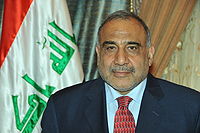Adil Abdul-Mahdi
| Adil Abdul-Mahdi عادل عبد المهدي |
|
|---|---|
 |
|
| Minister of Oil | |
|
In office 8 September 2014 – Now |
|
| Prime Minister | Haider al-Abadi |
| Preceded by | Abdul Karim Luaibi |
| Succeeded by | Jabbar al-Luaibi |
| President of Iraq | |
|
In office 7 April 2005 – 11 July 2011 |
|
| President | Jalal Talabani |
| Preceded by | Rowsch Shaways |
| Succeeded by | Tariq al-Hashimi |
| Minister of Finance | |
|
In office 2 June 2004 – 6 April 2005 |
|
| Prime Minister | Ayad Allawi |
| Succeeded by | Ali Allawi |
| Personal details | |
| Born | Baghdad, Iraq |
| Political party |
Supreme Islamic Iraqi Council (1982-present) Iraqi Communist Party (1970s) |
| Religion | Shia Islam |
Adil Abdul-Mahdi al-Muntafiki (Arabic: عادل عبد المهدي المنتفكي) is an Iraqi Shi'a politician, economist, and was one of the Presidents of Iraq from 2005 to 2011. He was formerly the Finance Minister in the Interim government.
Abdel-Mahdi is a member of the powerful Shi'a party the Supreme Islamic Iraqi Council, or SIIC. Long based in neighboring Iran, the group opposed a United States administration while holding close ties with the other U.S.-backed groups that opposed Saddam Hussein, including the Kurds and the Iraqi National Congress.
He is a trained economist who left Iraq in 1969 for exile in France. He worked for French think tanks and edited magazines in French and Arabic. He was educated in France, and is the son of a respected Shiite cleric who was a minister in Iraq's monarchy. He attended high school at Baghdad College, an elite American Jesuit secondary school.
In the 1970s, Abdul-Mahdi was a leading member of the Iraqi Communist Party. The Party split into two separate factions, the ICP-Central Committee, which was more accommodating of the military governments that had ruled Iraq since 1958, and the ICP-Central Leadership, which rejected all forms of cooperation of what it regarded as anti-progressive regimes, in 1967. Abdul-Mahdi joined the ICP-Central Leadership, and continued being active until it gradually disappeared by the early 1980s. By that time, Abdul-Mahdi adopted Iranian Islamic ideas, eventually merging with the Islamists when Ayatollah Khomeini eradicated the communists and other liberal oppositions groups in Iran. Abdul-Mahdi continued his association with Iran and gradually amalgamated his group within the ICP-Central Leadership with the Iranians, rejecting his Marxist past and devoting all his group's time to propagating Khomeini's ideas in France, where he lived at the time. He eventually was made a member of the Supreme Council for the Islamic Revolution in Iraq, an exiled opposition party and militia that was formed by Iran in Tehran in 1982 but composed exclusively of Iraqi exiles.
...
Wikipedia
